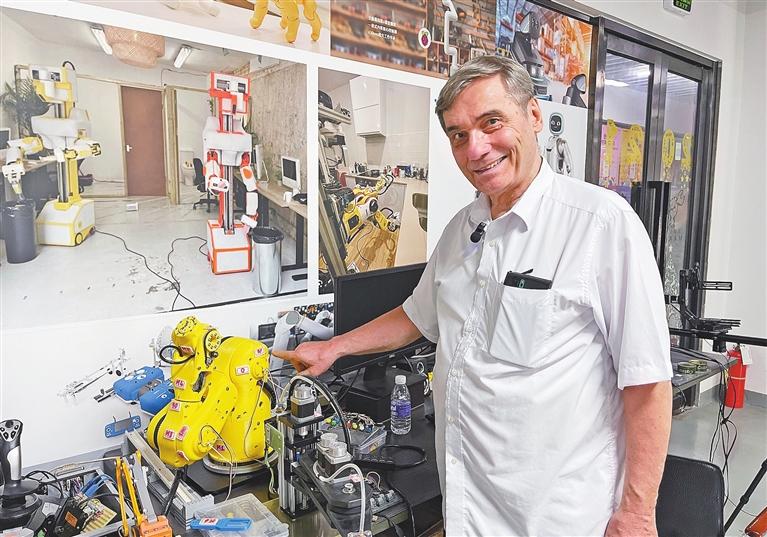
Liu Minxia mllmx@163.com DR. Leonardo de Palo, a seasoned professional with a Ph.D. in computer science, has found his professional calling and personal fulfillment in Shenzhen. After a successful decades-long career with industry giants like IBM, Dr. de Palo and his family relocated to Shenzhen in 2012 so that he could work for a Swiss company seeking new business opportunities in the city. When his contract with the Swiss company expired, he chose to stay in the city. With the belief that Shenzhen is an ideal place for tech aficionados like him who are enthusiastic about inventing new things, he soon became a maker. Embracing the city’s dynamic tech scene, Dr. de Palo said he was struck by the sheer magnitude of possibilities presented by the renowned electronics markets of Huaqiangbei, a tech haven where all imaginable electronics and cutting-edge technology can be found on one street. His daily routine often involved taking the Metro to Huaqiangbei to acquire components for his innovative projects. This convenience and easy access to resources allowed him to swiftly prototype his ideas, a process that fueled his creativity and passion, he said. Reflecting on his experience, Dr. de Palo also cited the city’s culture of innovation as a driving force behind his continued exploration of new technological horizons, even at a seasoned age. Rich experience From an early age, Dr. de Palo had a passion for disassembling toys to understand how they were made and then reassembling them in different ways. Dealing with the field of informatics since its inception, Dr. de Palo started his professional career as a hardware engineer at IBM, where he worked for 10 years. Later, he held the positions of research and development director and chief technology officer at other leading tech companies. Currently, his primary interest is industrial automation. Pursuing that interest, Dr. de Palo collaborated with other experts to develop the Theremino System, an open-source robotic operating system used for scientific research and teaching. Back in the 2010s, he managed a project to transition a Swiss bank to paperless operations. The bank needed to procure tablets for the project, and after conducting market research in Europe, North America, and Asia, the company chose a Shenzhen-based company to produce them. The project was very fruitful and successful, which landed Dr. de Palo a new job with handsome pay and better benefits. He was then sent to Shenzhen by his new employer and lived a very comfortable and pleasant life in Shekou. He said he didn’t anticipate the existence of places like Shekou in China, where people from around the world live harmoniously in a beautiful, green area next to the sea. “I always like to take a stroll in the Sea World area, to see the ships and to watch the sea,” he said. New goal An enjoyable life didn’t stop Dr. de Palo from innovating and exploring new technologies. Inspired by the limitless opportunities Shenzhen offers, Dr. de Palo opted to forego renewing his job contract when it expired 10 years later. Instead, he chose to remain in the city to pursue his vision of a higher rate of automation in homes and companies. “Shenzhen has everything I need, and some of my ideas can only be realized in Shenzhen,” he said. Drawing upon his rich experience in the personal computer (PC) industry, Dr. de Palo had always envisioned a more user-friendly way to connect PCs with the real world and empower individuals to harness robotics. He collaborated with several automation experts to develop the Theremino System, which allows people, including young children, to operate a robotic arm or robot and realize ideas such as typing, creating a drawing, or composing a piece of music. He said the Theremino System is a game-changer for small companies with limited resources that want to streamline their operations. It is also used by teachers to train future engineers. A nurturing environment To materialize his vision, Dr. de Palo established a startup at iMakerbase, a national-level innovation and entrepreneurship incubator and co-working space in Bao’an District that is renowned for its rapid prototyping capabilities and global network. “iMakerbase is an accelerator that integrates Shenzhen’s robust hardware supply chain network with its incubation services to help hardware creators both locally and globally materialize their ideas into tangible innovations at an unusually fast speed,” he said. The platform, which now has subsidiaries in 12 technologically advanced countries and regions like Japan, South Korea, and the United States, has incubated more than 200 projects globally. It provides support to projects like Dr. de Palo’s through operational guidance, financial backing, and marketing assistance, according to Zoey Zeng, vice president of iMakerbase. In addition to investing in Dr. de Palo’s company to support its growth, iMakerbase has also helped promote Dr. de Palo’s ideas and vision by organizing activities and seminars. Local government agencies have also shown their support. Recently, Dr. de Palo was invited to present his ideas on how small companies can benefit from desktop automation for enhanced efficiency at a seminar hosted by an agency under the Bao’an District Government. At the seminar, where automation professionals from different countries tried operating the robotic prototypes Dr. de Palo provided, he said he was glad to find a shared enthusiasm for the advancement of desktop automation technology and its transformative impact on businesses. “I give a lot of presentations to share my ideas and vision, and hopefully, I will gain some support,” he said. | 
